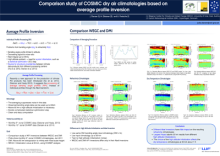Comparison study of COSMIC dry air climatologies based on average profile inversion
Julia
Danzer
Wegener Center for Climate and Global Change
Poster
Recently a new approach for the production of GNSS radio occultation climatologies has been proposed. The idea is to perform the averaging of individual profiles already in bending angle space and propagating the mean bending angle profiles through the Abel transform. Climatological products of refractivity, density, pressure, and temperature are directly retrieved, without applying prior a single profile processing chain.
The averaging of a large number of profiles suppresses noise in the data, enabling observed bending angle data to be used up to 80km. The new approach has the decisive advantage of avoiding the complicated statistical optimization step, a known error source between processing centers. Furthermore the idea leads to a cleaner and easier computation and a clear error characteristic.
This work is a follow up study, having the focus on the comparison of the new average profile inversion climatologies (API) between processing centers, i.e., WEGC and DMI. Furthermore data is studied relative to WEGC and DMI single profile inversion climatologies (IPI) and co-located ECMWF analysis fields. The new approach is tested on 10° monthly COSMIC climatologies, for the three test months January, February and March 2011.
The averaging of a large number of profiles suppresses noise in the data, enabling observed bending angle data to be used up to 80km. The new approach has the decisive advantage of avoiding the complicated statistical optimization step, a known error source between processing centers. Furthermore the idea leads to a cleaner and easier computation and a clear error characteristic.
This work is a follow up study, having the focus on the comparison of the new average profile inversion climatologies (API) between processing centers, i.e., WEGC and DMI. Furthermore data is studied relative to WEGC and DMI single profile inversion climatologies (IPI) and co-located ECMWF analysis fields. The new approach is tested on 10° monthly COSMIC climatologies, for the three test months January, February and March 2011.

Poster PDF
Abstract file
Abstract file